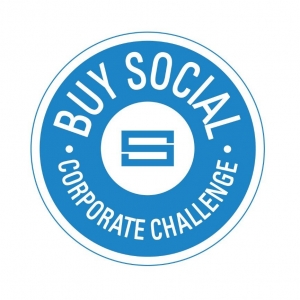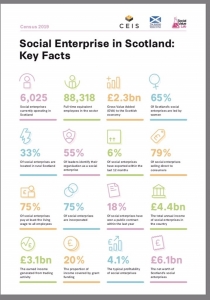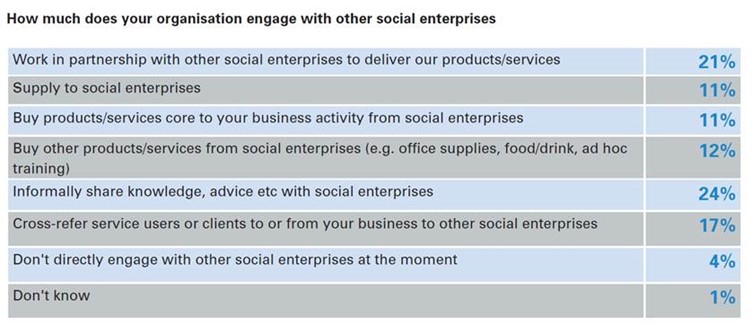Why it is time for Social Enterprise to
Buy Social
 By Ed Mayo, Chief Executive of Pilotlight
By Ed Mayo, Chief Executive of Pilotlight
It seems simple enough; social enterprises should trade together more. It is a bootstrap way to build a social economy and emerging from the pandemic, we need to pull together to build back better.
But we are a long way from this. Would it surprise you to know that, on one recent estimate, only one out of every four social enterprises are purchasing products or services from other social enterprises?
The early days of social enterprise were rooted in identity rather than trade. The flag of social enterprises attracted people who were willing to affiliate with a big idea and were liberated by it. The focus has been on new and growing social enterprises, spreading the model. Looking back, one legacy of this voluntarism has been its limits. Instead of building systems and scale, it is as if we have been working on the assumption that we can only change the world one social enterprise at a time.
How we do expect to build a social economy if we are not taking more care ourselves of how we direct our own spend?
To go fast, the saying goes, you should travel alone. But to go far, you should travel together.
There are three questions perhaps to ask ourselves:
- Why is collaboration not more prevalent across social enterprises?
- What can we do to encourage effective supply chain collaboration?
- Should we look to work across wider businesses with purpose?
The co-operative sector, overlapping with social enterprise of course, has long had an answer to these. It is called Principle 6 – co-operation between co-operatives – and it is embedded in international frameworks, national regulation and the articles of co-operatives themselves around the world. I would argue that we need the equivalent of a Principle 6 for the wider social enterprise sector.
Trade and exchange between co-operatives (secondary co-operation) has been at the heart of where co-operatives have been able to grow and make a big difference, in areas such as Northern Italy, Basque Spain, Finland and Francophone Canada.
In any region, once you have more than 10% market share through social enterprises such as co-ops, there can be an impact throughout the entire economy. Emilia Romagna in Italy for example is the region in Europe with the highest percentage of co-ops in regional gross value added, over 40%, and the lowest level of social and economic inequality. The networks of inter-trading across co-operatives in Italy, based on Principle 6, has led to the formation of wonderfully sophisticated financing mechanisms, such as mutual guarantee societies (a model we have never had in the UK) as well as development funds dedicated to new enterprise formation. In a ‘pay it forward’ model, every new social care co-operative in Italy commits to supporting a further co-op when they themselves are up and running.
We do have some great examples of social enterprises trading together:
 Toast Ale has made beer with Divine Chocolate. Enjoy!
Toast Ale has made beer with Divine Chocolate. Enjoy!- CSH Surrey has been proactive in looking to buy social and also to support social enterprises in their trading area.
- Over the lockdown, Renaisi, a social enterprise that helps people overcome disadvantage and exclusion, found new solutions through collaboration with other social enterprise, working with Bikeworks to deliver food and Hubbub to source mobile phones.
- Cosmic has partnered with 3 Spirit UK and with Iridescent Ideas to deliver training and consultancy.
- At Pilotlight, we have expanded the support service that we provide as a social enterprise ourselves from charities alone to include wider social enterprise. We are working for example now with Generation Success, which supports people from under-represented backgrounds into careers in business.
There are then those social enterprises who are set up to serve social enterprises, such as Roots HR, an accredited Social Enterprise Mark holder. Indeed, the Social Enterprise Mark itself would be an example, as a secondary service for social enterprises, as is FLOCERT, the fair trade accreditation service.
These are hopeful examples. The expansion of social enterprise associations and networks at UK, devolved and local level is a sign too of people wanting to connect and work together. But the reality of practice falls far short of this, as recent data from Social Enterprise UK for its research panel reveals.
Source: Social Enterprise UK
Only 11% of social enterprises buy social for things that are core to their business and a further 12% buy social for incidentals such as office supplies, training or food/drink. Taken together, it appears that around one in four social enterprises (23%) are buying from other social enterprises.
This may just be too low an estimate. The research methodology didn’t allow for multiple choice answers and there are other positive forms of collaboration that the data points to, notably a further 11% that supply to social enterprises and 21% that partner with social enterprise in service delivery. It is also a significantly lower estimate than data from the State of Social Enterprise report in 2019, which suggested that around one in three social enterprises (36%) generated income by trading with other social enterprises – although the same report also cautioned that this level had reduced compared to two years before (43%).
As a sector, our focus is on others. We want to persuade others to buy social and in this, we are following the money. I estimate that for every penny of expenditure by business on corporate social responsibility, £25 is spent on procurement that could be open to social enterprise, while for every penny given by government in charitable grants, £1 is spent on procurement.
 The Buy Social Corporate Challenge (and in Scotland) is going from strength to strength, with over 20 private sector partners now signed up. £91.5million has been spent by them with social enterprises. Extraordinary efforts have also been made with the Social Value Act, to open up public sector procurement, for the state to buy social. From 1st January 2021, all major central government procurements must now explicitly evaluate social value, where appropriate, rather than just “consider” it.
The Buy Social Corporate Challenge (and in Scotland) is going from strength to strength, with over 20 private sector partners now signed up. £91.5million has been spent by them with social enterprises. Extraordinary efforts have also been made with the Social Value Act, to open up public sector procurement, for the state to buy social. From 1st January 2021, all major central government procurements must now explicitly evaluate social value, where appropriate, rather than just “consider” it.
But how we do expect to build a social economy if we are not taking more care ourselves of how we direct our own spend?
We have a big task ahead of us and working together has to be a component of this. We need to think social and buy social in far more creative ways if we are to build an economy based on values and enterprise.
Some of the comments from survey respondents for Social Enterprise UK help perhaps to explain why this is currently so low. The enthusiasts are finding a way – “In our retail shop, we stock a wide of products from other social enterprises who share our values of good design and creating impact with every purchase. We also rent space in our offices and showroom to other social enterprises.”
But the practical barriers are putting off others:
- buying social is “not very important as there are not many to work with.”
- “I have not found other social enterprises in the textile industry who I can work with.”
- “We prioritise social enterprises as our suppliers but haven’t found many out there (we’re in retail, selling zero waste products).”
We can’t wish these barriers away, but equally they could be a priority for business development in the sector, because if buying social is to take off, here are the primary business opportunities.
At one point, Marks & Spencer was the most important source of small business development in the UK, with a team of 150 technicians who worked with domestic clothing suppliers to bring products to market. Why could co-operative retailers such as The Co-op, Midcounties, Central England, Lincolnshire, Scotmid and Southern Co-op, for example, not play a similar, patient role in bringing forward social enterprise products onto the shelves? After all, thirty years ago, as I saw, they were key to making things work for fair trade.
Where businesses collaborate in this way, it is possible to create a better outcome for all involved. Collaboration in business helps us to problem solve. It brings people together and opens up opportunities to learn from each other. Collaboration opens ups channels of development and of marketing that may have been closed before. Above all, it boosts morale, reducing the feeling of isolation and creating a sense of contribution and shared purpose.
 There are opportunities here. In Scotland, the Social Enterprise Census concluded that the social enterprise sector – including housing associations and credit unions here – spent £3.98billion collectively in the last financial year. Imagine the multiplier if we spent more of that through high quality and high impact social enterprises. Indeed, in conversation with me on this, Chris Martin, Chief Executive of Social Enterprise Scotland, suggests the need now for a Buy Social Challenge for social enterprises; to help map their spend and set targets for purchasing.
There are opportunities here. In Scotland, the Social Enterprise Census concluded that the social enterprise sector – including housing associations and credit unions here – spent £3.98billion collectively in the last financial year. Imagine the multiplier if we spent more of that through high quality and high impact social enterprises. Indeed, in conversation with me on this, Chris Martin, Chief Executive of Social Enterprise Scotland, suggests the need now for a Buy Social Challenge for social enterprises; to help map their spend and set targets for purchasing.
Just the process of mapping spending, as local authorities such as Preston have found, can help identify opportunities for business development. In the co-operative sector, many of the large ‘secondary’ co-ops in areas like Finland and Francophone Canada were formed by primary co-ops generations ago, coming together to create service providers. With the demand side on side, the suppliers they formed faced none of the usual early-stage trading challenges of winning sales for a new entrant. As businesses owned by co-ops, this also bound the new enterprises into a wider sector, with accountability flowing back to those they were serving.
Arguably, for scale, we could also be looking towards an integrated approach to buying social, including all organisations in social ownership and impact – including co-ops, mutuals, employee-owned firms, worker co-ops, B Corps, charities and non-profits.
Pauline Gannon of Social Impact Ireland tells me that this is exactly what is needed: “a true, innovative, pathway forward to putting social at the heart of all business, not just social enterprise.”
But I know… start on definitions again and we are all more likely to fall out than hang together.
We need a green, employment rich, caring and creative economy for the UK. This could be and ought to be led by social enterprises… We need to compete at scale, and to do that, we need to pull together.
Even Principle 6 in co-operatives has proved patchy in some countries and some sectors – international research by Euricse suggests that it is one of the least observed of the seven co-operative principles dating back to the nineteenth century Rochdale Pioneers.
We have a big task ahead of us and working together has to be a component of this. We need to think social and buy social in far more creative ways if we are to build an economy based on values and enterprise. Rather than celebrate simply the numbers of social enterprise, we should test the extent to which we are creating social enterprise value chains at scale. Imagine cascades of buying social throughout the economy and the effect this could have.
We need a green, employment rich, caring and creative economy for the UK. This could be and ought to be led by social enterprises.
We are not here to mess about, nor simply to sing our own praises as a sector. There is a bigger prize. We need to compete at scale, and to do that, we need to pull together.
It is time for social enterprise to think big… and to buy social.
Ed Mayo is Chief Executive of Pilotlight – an award-winning charity and social enterprise which transforms the lives of disadvantaged people in the UK by offering charities and social enterprises access to the strategic business support they need to become more efficient, effective and sustainable.
Thanks to the following for their contributions to this blog post – Chris Martin (Social Enterprise Scotland), Julie Hawker (Cosmic), Pauline Gannon (Social Impact Ireland), Andrew O’Brien (Social Enterprise UK), Rose Marley (Coops UK), Martin Shaw (Association of Financial Mutuals).
Buy Social







Leave a Reply
Want to join the discussion?Feel free to contribute!